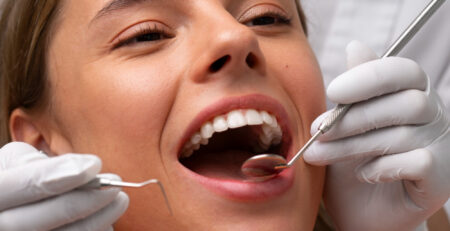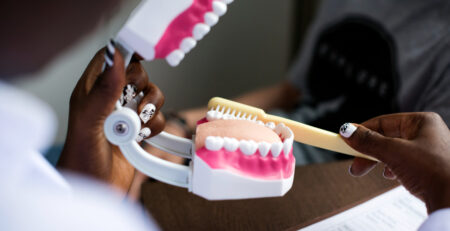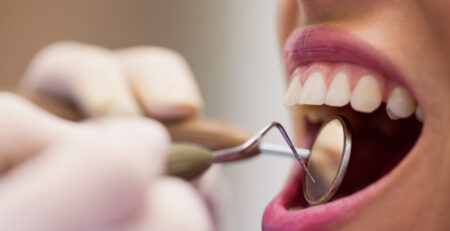Signs You Need To See the Dentist
A small ache, some bleeding while brushing, or a bit of bad breath might not seem like much. But those little signs could mean something more serious is developing under the surface. Knowing what to look for can make a real difference in keeping your teeth and gums healthy for years to come.
Increased Tooth Sensitivity Signaling Potential Enamel Erosion
If sipping on cold water or biting into a warm meal sends a sharp jolt through your teeth, it’s time to pay attention. Tooth sensitivity isn’t just annoying—it often signals that the enamel protecting your teeth is wearing away. This layer doesn’t grow back, and once it’s compromised, the inner layers of the tooth become exposed to temperature changes, causing discomfort. Many assume it’s something they just have to live with, but it’s a clear sign to visit the dentist.
This kind of sensitivity can develop gradually, making it easy to ignore until it becomes more painful or frequent. It might show up while brushing or eating certain foods. People with acid reflux or those who consume a lot of acidic drinks may be more prone to enamel erosion. A dentist can evaluate the damage and suggest treatments to strengthen enamel and prevent further wear.

Persistent Gum Inflammation Indicating Early Gingival Disease
Gums that stay red, swollen, or bleed during brushing could be more than just irritated—they’re often showing early signs of gingivitis. Gum inflammation is the body’s response to bacteria building up around the gum line. If not addressed quickly, it can progress into more severe gum disease, which threatens both your teeth and the bone beneath them.
Ignoring gum symptoms might lead to deep infections that are harder to treat. The early stages can often be reversed with professional cleanings and better home care, but only if caught early. If brushing feels uncomfortable or gums pull back from the teeth, a dental checkup is overdue. It’s not just about saving teeth—healthy gums play a vital role in overall wellness, including heart health.
Chronic Halitosis That Points to Hidden Dental Decay
Persistent bad breath, or halitosis, isn’t just a social issue—it can be a sign of underlying dental problems. Regular brushing and mouthwash may only mask the odor if the root cause lies deeper. Food particles trapped between teeth, untreated cavities, or gum infections often fuel bacteria growth that causes lasting bad breath.
Even if you’re using proper oral hygiene habits, halitosis that doesn’t go away may mean a cavity is forming in a hard-to-see area. Long-term breath issues deserve a professional look—especially if people around you are noticing it, even if you’re not.
Noticeable Changes in Bite Alignment or Jaw Comfort
Teeth that feel like they no longer fit together, or jaws that start clicking, popping, or aching, may be telling you something’s off. Changes in bite alignment could result from shifting teeth, jaw tension, or even teeth grinding at night. Over time, this can wear down enamel, cause pain, or lead to jaw disorders like TMJ.
If chewing starts feeling different or your jaw gets sore during meals, it’s time for a dental exam. Dentists can detect small shifts in bite before they turn into bigger problems. Sometimes the fix is as simple as a night guard or realignment work to stop further discomfort. Catching these changes early keeps things from worsening and protects long-term oral function.
Recurring Mouth Sores Suggesting Oral Health Concerns
Mouth sores that won’t heal or keep coming back can point to a deeper oral issue. While canker sores are common and usually harmless, frequent ones or those that stick around longer than expected may signal something more. They could be signs of vitamin deficiencies, immune disorders, or infections that need more than just over-the-counter relief.
Dentists can tell the difference between common irritation and signs of something more serious. Persistent sores could even be an early sign of oral cancer, especially if they appear in the same spot or are accompanied by other symptoms like difficulty swallowing. Don’t ignore changes inside the mouth—they often reveal more than meets the eye.
Unexplained Tooth Discoloration Hinting at Internal Damage
A dark spot on a tooth may seem cosmetic, but internal tooth damage is often to blame. Discoloration from the inside out can happen after trauma, infection, or even unnoticed decay deep in the tooth. It usually doesn’t hurt right away, which is why many people wait too long before seeing a dentist.
Not all stains are caused by coffee or wine. A single tooth changing color, especially turning gray or brown, deserves a professional check. In some cases, the root or nerve of the tooth is dying, which could require treatment like a root canal. The sooner a dentist examines it, the better the outcome and the easier the fix.
Painful Chewing or Unusual Pressure in Teeth
Sharp pain while chewing or a constant feeling of pressure in your teeth might be more than sensitivity. These sensations can be early indicators of a cracked tooth, infected pulp, or loose filling. Pain that shows up only while eating is a sign your teeth are under stress and could be at risk of further damage.
Even a small crack can lead to larger dental problems if left alone. Teeth under stress need support and often quick repairs to prevent them from breaking or requiring extraction. Dentists can spot these subtle signs with an exam or X-rays, offering solutions before the pain worsens. Catching it early often means saving the tooth.
Sudden, Persistent Dry Mouth Affecting Oral Comfort
Dry mouth isn’t just uncomfortable—it’s a warning sign. Saliva plays a big role in neutralizing acids and washing away bacteria. When saliva production drops, the risk of decay, gum disease, and mouth infections goes up. This condition, often caused by medications or certain health conditions, needs attention.
If the mouth stays dry despite drinking water or chewing gum, it’s time to see a dentist. We can recommend treatments or adjustments to help restore moisture. A persistently dry mouth can also lead to difficulty swallowing, changes in taste, and a burning feeling in the mouth—all signs that your oral health may be declining without the right care.
Protect Your Smile with Professional Care at Lumina Dental in Maple Ridge and Catch These Subtle Signs Before They Worsen
Many people wait too long to address dental problems, thinking the signs will go away. But the truth is, subtle issues like tooth sensitivity, jaw pain, or gum inflammation can lead to bigger problems if ignored. That’s why early care matters. At Lumina Dental in Maple Ridge, our team takes time to understand not just your symptoms, but what’s behind them. Whether it’s enamel erosion, chronic dry mouth, or lingering sores, their advanced technology and caring approach help you feel at ease while they find the root of the issue.
Our dental team at Lumina Dental offers personalized solutions with a focus on prevention and comfort. We combine modern techniques with a warm, welcoming environment to make every visit stress-free. From routine checkups to targeted treatments, we ensure your oral health stays strong and pain-free. Don’t ignore the signs—your body is trying to tell you something. Contact us today and schedule your visit at Lumina Dental to stay one step ahead of your dental health.











